This article was co-authored by Monica Kieu, DO, FACS. Dr. Monica Kieu is a board certified Otolaryngologist and Specialist in Facial Plastic and Reconstructive Surgery in Los Angeles, California. Dr. Kieu received a BS in Anthropology from the University of California, Riverside and earned her medical degree (DO), with honors, from Western University of Health Sciences in Pomona. She then completed her residency in Otolaryngology-Head and Neck Surgery at Michigan State University/Detroit Medical Center, where she served as chief resident. Dr. Kieu also completed a prestigious fellowship in Facial Plastic and Reconstructive Surgery at the University of Toronto. She is a member of the American Academy of Otolaryngology-Head and Neck Surgery, American Osteopathic Colleges of Ophthalmology and Otolaryngology-Head and Neck Surgery, American Academy of Cosmetic Surgery, American Academy of Facial Plastic and Reconstructive Surgery, and the American Rhinologic Society. Dr. Kieu was recently named one of LA’s Top Docs by Los Angeles Magazine.
There are 12 references cited in this article, which can be found at the bottom of the page.
This article has been viewed 157,250 times.
Breathing is something that we do so often, we might not always give it the proper attention we should. If there are some difficulties with your breathing, there are a few steps you can take improve the quality of both your breath and the air in your environment.
Steps
Improving Your Breathing
-
1Breathe through your nose. Although most of us are able to breathe through our mouths, you should always favor breathing in through your nose. Your nose is specifically designed for the intake of air and will help filter out particles and dust.[1] [2]
- Your nose has thin hairs and mucous that will help keep the air entering your lungs clean.
- Breathing in through your mouth may cause your mouth and throat to dry out.
- Your nose produces a gas called nitric oxide that enhances your immune system[3] and may even increase the oxygenation of your blood.[4]
-
2Take deep breaths. Either due to bad breathing habits or from being under stress, many people take quick and shallow breaths. Breathing provides vital oxygen to the body, and these short breaths don't carry as much oxygen as deeper and slower breathing will.[5]
- Inhale through your nose.
- Imagine you are filling your belly up with air. At the start of the breath, your stomach should rise first, before your chest.
- When your stomach is “full” continue the inhalation, allowing the chest to rise now.
- Take your time breathing in. A good breath should last around five seconds on the inhalation.
Advertisement -
3Exhale properly. Just as with inhaling, exhalations of the breath should be done slowly. Exhaling too quickly lessens the time that our lungs can intake oxygen and remove carbon dioxide.
- Exhale through your mouth. You can try pursing your lips to slow the exhalation.[6]
- Let the lungs push the air out at their own pace. Try not to force air out of your lungs.
- Start the exhalation at the stomach level, letting your diaphragm relax first. Your chest should fall with or after your stomach does.
- Don't rush the exhalation. Just like with the inhalation, you should take a few seconds to exhale.
Breathing During Exercise
-
1Keep a good rhythm when running. If you are a jogger, you can improve your runs by employing better breathing techniques. The main technique involves breathing in a certain rhythm and deeply inhaling and exhaling.[7]
- Try to keep your breathing ratio around 3:2, in relation to your steps. For three steps, inhale deeply. For the next two steps, exhale as fully as you can.
- You may need to change the ratio as you increase the intensity of your run. Always keep the inhalation longer than the exhalation as you make your adjustments.
- Shorter breaths mean less oxygen and greater amounts of carbon dioxide in your body. This results in your heart working harder than it has to and a decrease in athletic performance.
-
2Breathe correctly when strength training. Weight lifting or body weight exercises can be a great way to build strength and add muscle. Breathing properly during these activities can increase the amount of exercise you are able to do. Remember the following tips during your strength training routines:[8]
- When you are exerting yourself, exhale. For example, when lifting a weight, let yourself exhale fully.
- Inhale when relaxing the movement. For instance, when lowering the weight back down, take a deep breath.
- Your breathing should correspond to the lifting and lowering of whatever weight you are lifting.
- Properly breathing during strength training prevents injury and increases performance.
-
3Use your natural breath during stretching. Breathing during your stretching sessions, after or before a workout, most closely resembles the way in which you normally breathe. Relaxed and full inhalations and exhalations are the key.[9]
- Inhale through your nose. Your nose is specially designed to filter incoming air.
- Some experts believe that it's best to exhale through your nose as well.
- Get a deeper breath by inhaling with your diaphragm as opposed to your chest.
- Never force your breath, either on the inhalation or exhalation.
- Try getting a deeper stretch as you exhale, relaxing into the motion.
-
4Exercise to improve breathing. By getting proper exercise you will increase the quality and efficiency of your breathing. The main cause of this is that by improving the health and strength of your muscles, they will function better, requiring less oxygen.[10]
- If you are new to exercise, or have a condition such as COPD, try starting out with light workouts. Aim for increasing the length of time that you exercise rather than increasing the intensity of exercise.[11]
Improving Air Quality
-
1Monitor moisture levels in your house. Too much moisture or high humidity can promote the growth of molds and mildew. Mold and mildew can be harmful to the respiratory system and may cause respiratory problems.
- Devices to measure humidity are widely available at any home improvement or household stores.
- Purchase and use a dehumidifier if your humidity levels are too high. Remember to regularly empty the water it collects from your house.
-
2Make sure your house is properly ventilated. Stagnant air can be harmful to breathe as it may have accumulated allergens, microbes, or other irritants. Create airflow in your house to let fresh air enter your space and allow stale air an exit.[12]
- Opening a few windows is the easiest way to create airflow in your house.
- You may also try to place a fan, either pulling air in or pushing air out, to help increase airflow.
- HVAC systems may be installed in your home to greatly improve air quality.
-
3Avoid smoking. Smoking indoors will immediately introduce harmful chemicals into the air. These won't simply vanish with the smoke but will instead cling to many surfaces in the room. If you must smoke, do it outside.[13]
- Smoking anywhere will harm your lungs and make breathing less efficient.
- Incense or other scented combustibles also release smoke and reduce the air quality in your home.
-
4Get some house plants. House plants are a great and easy way to improve the quality of air in your house. Plants absorb many chemicals in the air that humans cannot breath, such as carbon dioxide, and release oxygen that we need. Some plants are more efficient at this than others, review the list and pick your favorites:[14]
- Aloe vera.
- Spider plants.
- English ivy.
- Azaleas.
Expert Q&A
Did you know you can get expert answers for this article?
Unlock expert answers by supporting wikiHow
-
QuestionWhat is the best exercise for lungs?
 Francisco GomezFrancisco Gomez is the Head Coach at the FIT Potato Gym, a training gym established in 2001 in the San Francisco Bay Area. Francisco is a former competitive runner who helps endurance athletes train for major marathons like the Boston Marathon. Francisco specializes in Injury Rehab, Flexibility, Marathon Training, and Senior Fitness. He has a B.S. in Nutrition and Exercise Physiology & Running.
Francisco GomezFrancisco Gomez is the Head Coach at the FIT Potato Gym, a training gym established in 2001 in the San Francisco Bay Area. Francisco is a former competitive runner who helps endurance athletes train for major marathons like the Boston Marathon. Francisco specializes in Injury Rehab, Flexibility, Marathon Training, and Senior Fitness. He has a B.S. in Nutrition and Exercise Physiology & Running.
Fitness Coach
-
QuestionWhy do I run out of breath so easily when I work out?
 Francisco GomezFrancisco Gomez is the Head Coach at the FIT Potato Gym, a training gym established in 2001 in the San Francisco Bay Area. Francisco is a former competitive runner who helps endurance athletes train for major marathons like the Boston Marathon. Francisco specializes in Injury Rehab, Flexibility, Marathon Training, and Senior Fitness. He has a B.S. in Nutrition and Exercise Physiology & Running.
Francisco GomezFrancisco Gomez is the Head Coach at the FIT Potato Gym, a training gym established in 2001 in the San Francisco Bay Area. Francisco is a former competitive runner who helps endurance athletes train for major marathons like the Boston Marathon. Francisco specializes in Injury Rehab, Flexibility, Marathon Training, and Senior Fitness. He has a B.S. in Nutrition and Exercise Physiology & Running.
Fitness Coach You're probably pushing yourself too hard, too fast. Unless your goal is to push yourself to the brink of exhaustion and complete an entire workout in 20 minutes or something, you shouldn't be spending all of your energy at the start. Try going a little slower, take regular breaks, and don't overdo it.
You're probably pushing yourself too hard, too fast. Unless your goal is to push yourself to the brink of exhaustion and complete an entire workout in 20 minutes or something, you shouldn't be spending all of your energy at the start. Try going a little slower, take regular breaks, and don't overdo it. -
QuestionIs it normal to breathe out of your mouth when you sleep?
 Monica Kieu, DO, FACSDr. Monica Kieu is a board certified Otolaryngologist and Specialist in Facial Plastic and Reconstructive Surgery in Los Angeles, California. Dr. Kieu received a BS in Anthropology from the University of California, Riverside and earned her medical degree (DO), with honors, from Western University of Health Sciences in Pomona. She then completed her residency in Otolaryngology-Head and Neck Surgery at Michigan State University/Detroit Medical Center, where she served as chief resident. Dr. Kieu also completed a prestigious fellowship in Facial Plastic and Reconstructive Surgery at the University of Toronto. She is a member of the American Academy of Otolaryngology-Head and Neck Surgery, American Osteopathic Colleges of Ophthalmology and Otolaryngology-Head and Neck Surgery, American Academy of Cosmetic Surgery, American Academy of Facial Plastic and Reconstructive Surgery, and the American Rhinologic Society. Dr. Kieu was recently named one of LA’s Top Docs by Los Angeles Magazine.
Monica Kieu, DO, FACSDr. Monica Kieu is a board certified Otolaryngologist and Specialist in Facial Plastic and Reconstructive Surgery in Los Angeles, California. Dr. Kieu received a BS in Anthropology from the University of California, Riverside and earned her medical degree (DO), with honors, from Western University of Health Sciences in Pomona. She then completed her residency in Otolaryngology-Head and Neck Surgery at Michigan State University/Detroit Medical Center, where she served as chief resident. Dr. Kieu also completed a prestigious fellowship in Facial Plastic and Reconstructive Surgery at the University of Toronto. She is a member of the American Academy of Otolaryngology-Head and Neck Surgery, American Osteopathic Colleges of Ophthalmology and Otolaryngology-Head and Neck Surgery, American Academy of Cosmetic Surgery, American Academy of Facial Plastic and Reconstructive Surgery, and the American Rhinologic Society. Dr. Kieu was recently named one of LA’s Top Docs by Los Angeles Magazine.
Board Certified Otolaryngologist It's actually not natural to be a mouth breather. It's best to breathe through your nose. Mouth breathing can be caused by a few things. Usually, it's from having a blocked nose, like nasal congestion from allergies, a cold, or a sinus infection. A deviated septum, polyps, large turbinates, or even just the shape of your nose can all cause nasal congestion, which leads to mouth breathing.
It's actually not natural to be a mouth breather. It's best to breathe through your nose. Mouth breathing can be caused by a few things. Usually, it's from having a blocked nose, like nasal congestion from allergies, a cold, or a sinus infection. A deviated septum, polyps, large turbinates, or even just the shape of your nose can all cause nasal congestion, which leads to mouth breathing.
Warnings
- Always have installed a smoke and carbon monoxide detector.⧼thumbs_response⧽
- If you are having serious trouble breathing, see a doctor.⧼thumbs_response⧽
References
- ↑ http://www.ncbi.nlm.nih.gov/pubmed/8599744
- ↑ Monica Kieu, DO, FACS. Board Certified Otolaryngologist. Expert Interview. 20 October 2020.
- ↑ https://www.ncbi.nlm.nih.gov/pubmed/18951492
- ↑ https://www.breatheology.com/articles/nitrogen-oxide-pleasant-poison/
- ↑ Francisco Gomez. Competitive Runner. Expert Interview. 24 October 2019.
- ↑ http://www.nlm.nih.gov/medlineplus/ency/patientinstructions/000053.htm
- ↑ Francisco Gomez. Competitive Runner. Expert Interview. 24 October 2019.
- ↑ https://www.mayoclinic.org/healthy-lifestyle/fitness/in-depth/weight-training/art-20045842
- ↑ http://web.mit.edu/tkd/stretch/stretching_5.html#SEC55
- ↑ https://www.betterhealth.vic.gov.au/health/HealthyLiving/breathing-problems-and-exercise
- ↑ https://www.health.harvard.edu/healthbeat/10-tips-for-exercising-safely
- ↑ http://www.usgbc.org/articles/how-improve-air-quality
- ↑ http://www.usgbc.org/articles/how-improve-air-quality
- ↑ https://ntrs.nasa.gov/archive/nasa/casi.ntrs.nasa.gov/19930073077.pdf
About This Article
To improve your breathing, make sure you're breathing in through your nose whenever possible, which is more effective at filtering out particles and dust. Try to fill your lungs slowly with as much air as possible so your lungs can take in the most oxygen. Then, exhale through your mouth slowly. If you want the best air quality in your home or office, keep the rooms well ventilated by opening windows or using a fan. You can also keep house plants, like aloe vera, English ivy, and spider plants, in a room, which produce oxygen and improve the quality of the air. For more tips from our Personal Trainer co-author, including how to improve your breathing during exercise, read on!
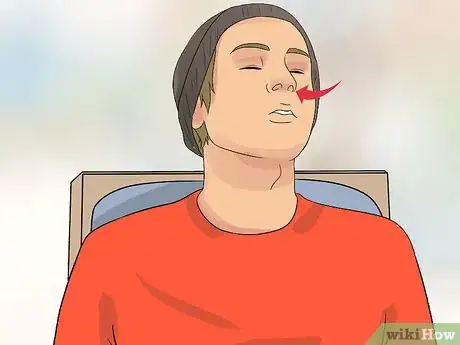

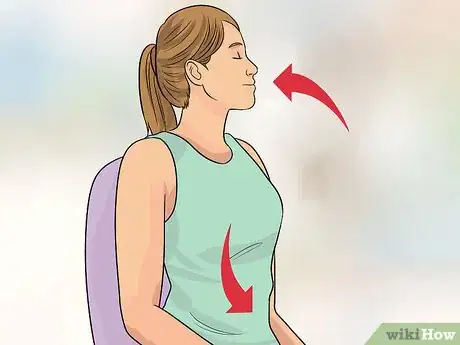



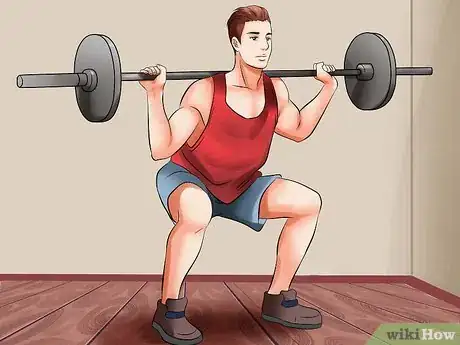





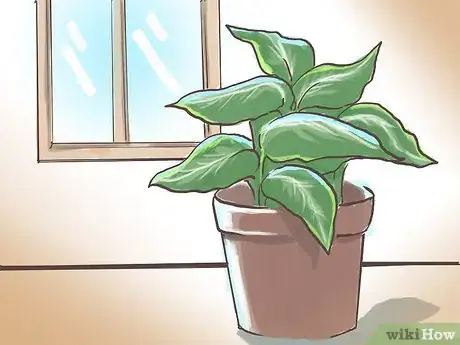


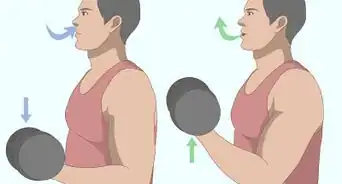


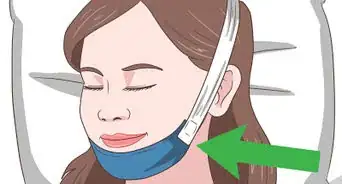




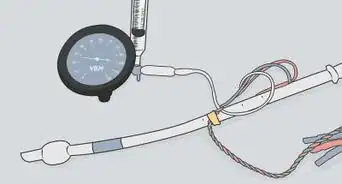
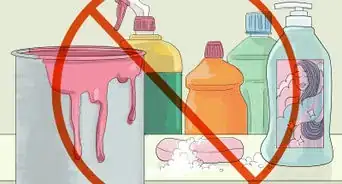










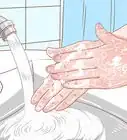





































Medical Disclaimer
The content of this article is not intended to be a substitute for professional medical advice, examination, diagnosis, or treatment. You should always contact your doctor or other qualified healthcare professional before starting, changing, or stopping any kind of health treatment.
Read More...